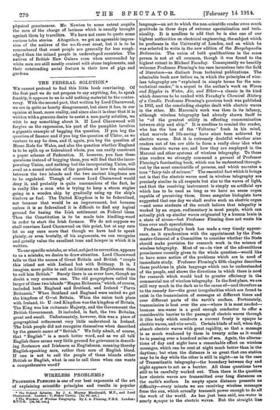THE FEDERAL SOLUTION.*
WE cannot pretend to find this little book convincing. Of the first part we do not propose to say anything, for, to speak frankly, it appears to us to add nothing material to the contro- versy. With the second part, that written by Lord Charnwood, we are in quite as hearty disagreement, but since it has, in our opinion at least, more reality, and since also it is clear that it is written with a genuine desire to assist a non-party solution, we wish to say something about it. If Lord Charnwood will forgive us the expression, his part of the pamphlet involves a gigantic example of begging the question. If you beg the question of finance and if you beg the question of Ulster, as we venture to say he does, and if, again, you beg the question of Home Rule for Wales, and also the question whether England is to be split up or federalized whole, you can easily construct a paper scheme of Federation. If, however, you face these questions instead of begging them, you will find that the incor- porating Union, and nothing but the incorporating Union, will avail as a sound solution of the problem of how the relations between the two islands and the two ancient kingdoms are to be regulated. Though of course Lord Charnwood would deny it, and probably is quite unconscious of the fact, he is really like a man who is trying to keep a steam engine going in a wooden ship by gradually using up the ship's timbers as fuel. The United Kingdom is to be federalized, not because that would be an improvement, but because unless it is so federalized it is difficult to find any logical ground for basing the Irish settlement on Federal ideas. Thus the Constitution is to be made into kindling-wood in order to start the Irish furnace. We do not suppose we shall convince Lord Charnwood on this point, but at any rate let us say once more that though we have had to speak plainly, or even brutally, of his arguments, we can recognize and greatly value the excellent tone and temper in which it is written.
To one specific mistake, or what, subject to correction, appears to us a mistake, we desire to draw attention. Lord Charnwood tells us that the names of Great Britain and British "couple this island not with Ireland but with Brittany. It is, I imagine, more polite to call an Irishman an Englishman than to call him British." Surely there is an error here, though no doubt a very common one. The old geographers called the larger of these two islands "Magna Britannia," which, of course, included both England and Scotland, and Ireland "Parva Britannia." When Scotland and England were united we got the kingdom of G•eat Britain. When the union took place with Ireland, th, II .iced Kingdom was the kingdom of Britain, The King was his Britannia Majesty, and the Government the British Government. It included, in fact, the two Britain, great and small. Unfortunately, however, this was a piece of geographical refinement very little understood in Ireland. The Irish people did not recognize themselves when described by the generic name of "British." We fully admit, of course. that " English " is a much better word, and as we all talk English there seems very little ground for grievance in describ- ing Scotsmen and Irishmen as Englishmen, meaning thereby English-speaking men, rather than men of English blood. If one is not to call the people of these islands either British or English, what is one to call them when one wants a comprehensive word?






































 Previous page
Previous page